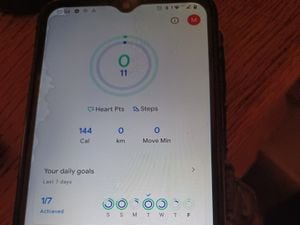Jobs for the girls in a man's world
It is almost a century since women got the vote more than 35 years since Mrs Thatcher took the helm at Number 10 as the UK's first female prime minister.
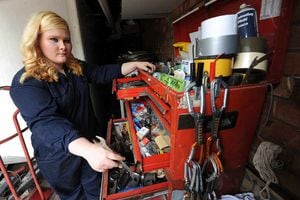
But despite the great strides taken in so many areas, there are still those who need convincing that women really can do anything men can do - particularly when it comes to work in the trades industry.
It is something Andrew Cartwright, head of technology at City of Wolverhampton College, says is gradually improving.
In the five years he has been in the role he says the number of female students in industrial courses is on the up.

In engineering, women make up about 19 per cent of the roll, with construction sitting at 12 per cent - an improvement of the three to four per cent when he first took the job, with the lowest uptake in trades, including construction, bricklaying, and carpentry.
To get the message across women working in trades are now going into schools and speak to younger girls about just what a career as an engineer or a carpenter might entail, showing them a positive role model in the industry.
He said: "We get the message out that there are jobs out there - and well-paid jobs - other than the more traditional women-only route."
Female students of his have gone on to jobs with JLR and Carillion, high-profile jobs running sites and teams, he says: "There are good jobs out there for them."
While 'in the press and on the telly' many roles are traditionally portrayed as jobs for the boys, the industry is moving forward, he says.
"I think young girls who are nine or 10 realise they can do anything. I think the message has got to get across to teachers and parents."
It is the parents and teachers, women in their 30s, 40, 50s, who the college is targeting as part of a 'two pronged' attack.
As the number of women in male-dominated industries continues to rise, a government campaign aims to inspire females to take on trades.
The Not Just For Boys campaign, launched in February, aims to dispel the myth that certain industries are for men only.
By encouraging those working in industries such as engineering and construction to share their stories, the campaign aims to support and inspire women to consider the broad range of careers open to them.
As well as jobs in industry, they hope to encourage more women to take up apprenticeships - earlier this year the then-Deputy Prime Minister Nick Clegg announced phenomenal growth in women taking up apprenticeships over the past five years.
The figures showed that more than one million women started apprenticeships between 2010/11 and 2013/14, compared to just 400,000 in the four previous years.
The number of women starting an apprenticeship has also outstripped men by more than 130,000 since 2010. Over 1.1 million women had started apprenticeships since 2010/11 compared to 972,000 men.
The Government says the Not Just For Boys campaign is 'all about choice - supporting and inspiring women to make decisions that are right for them'.
"If you're looking to recruit your next employee, or you're making career decisions, help raise awareness of the options available and inspire others by sharing your story."
It encourages employers to be positive role models with their organisation, join up to the New Enterprise Allowance scheme and become a mentor, offer a work experience placement or set up a skills academy, and advertise vacancies at Jobcentre Plus.
As well as workplaces getting on board, women in the industry are being invited to join the online conversation, posting photos of themselves and their colleagues at work, sharing why they love their job and the sector they work in, offering their top tips for other women wanting a similar job, and talking about the work they are doing to tackle the issue of under-representation in the industry.
The posts can be followed on Twitter by searching #notjustforboys.
In September the college will be kicking off the first of its 'women only' courses, weekly classes held over the course of 10 weeks in car maintenance and home DIY.
Mr Cartwright says these are skills that would not have been taught to girls at school decades ago, as they were still seen as boys' jobs.
Each course will teach basic skills, and Mr Cartwright hopes that by teaching older women these skills, they will see they are just as capable as men, and encourage younger girls to give it a go whether they be their daughters, pupils, or other friends or relatives.
And there is no minimum age on the course, as long as those under 16 are accompanied by a parent, so young girls will be able to learn valuable hand skills they will use throughout life, and maybe even inspire their career.
Participants will be assessed throughout, earning a certificate on completion as well as a tool kit so they can keep up with their new trade skills.
And for those who are keen to build on their newfound handy(wo)man tricks, they can move on to one of the college's longer, accredited courses and work toward a job in the industry.
As far as the old argument that women don't have the muscle for trades jobs, Mr Cartwright says that isn't an issue.
"If you think about construction nowadays, the traditional idea of a hod carrier...who would throw the hod over their shoulder and carry it up the ladder for the bricklayer, nobody does that anymore. Cement is carried up scaffolding on a crane, it is more efficient that way.
"A woman can pick up a brick exactly the same way a man can. A woman can use math in exactly the same way a man can. And some of my female engineers would say better than a man can.
"In the year of celebrating the end of the wars, I look at all of the roles women did during the Second World War and we sort of regressed a bit when the men came back. Women are very capable of doing all of the jobs men can do, we just need to convince people that is the way again."
However it may be that employers are lagging behind when it comes to getting the message.
One student who is nearing the end of her studies is Georgina Hordell, aged 18, who has almost completed a two-year BTEC Level 3 Extended Diploma in Manufacturing Engineering.
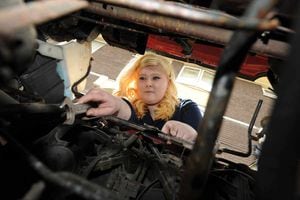
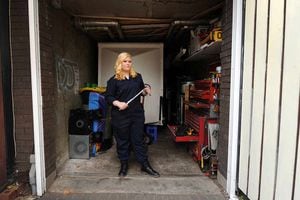
Sending out her CV in the hopes of scoring a job, she is already finding it tough-going as a women in a male-dominated industry.
She says: "I have been to so many job interviews. It is such a good qualification to have, but being a women, getting a job in it is very difficult.
"Most of the interviewers we get put with are male, and I think they feel like we aren't going to be super strong for the job, you need a lot of physical muscle for it depending on what type of job you get."
At one group interview she attended Georgina, who lives in Heath Town, was one of just three women out of 35 applicants.
She feels in those situations there is more pressure on female job hopefuls to be vocal and show they can step up and be leaders.
And while there is a lot of focus on whether women are strong enough, Georgina thinks women have advantages over their male counterparts: "We are faster learners, we can solve mathematical questions quickly - we are more mentally strong than physically strong."
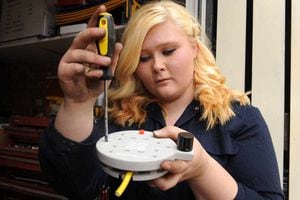
Inspired by her father and grandfather, who both work with cars, she wanted to do something slightly different and signed up for the college course with the aim of working as an electrical engineer.
A lot of people are surprised when they find out what she is studying, she says, and she is the only girl in her class of 16 students.
While she gets the odd 'go make me a sandwich' joke thrown at her, Georgina says she is treated no differently in her classes.
"When I first started they were saying they had one girl but she left within two weeks, so I think they are more surprised I am still here.
"I think it just shows that it is not just a man's job, it is for women as well."
Also forging a career in engineering is Sarah Fathers, who is a year into her five-year apprenticeship with Alucast in Wednesbury.
The 17-year-old, who studies through the college, had initially planned to study architecture until a teacher suggested engineering might be a better fit.
Sarah, from Tipton, says: "I spoke to the careers advisor and the job basically described everything I wanted. It is hands-on and creative, and I have always wanted to do practical things rather than sit down doing paperwork and stuff. You can get your hands dirty and you can just go for it.
"I don't regret it for a second and it has been a great experience. It has opened my eyes to what I want to do and there are lots of opportunities in my workplace, from maintenance to productivity and quality.
"I reckon women can do exactly what men can do. Any girls that want to get into engineering just really need to go for it - if it is something you are contemplating, just 100 per cent go for it."
And while the University of Wolverhampton does not offer any 'women-only' courses, figures show the number of female students taking courses traditionally seen as male-dominated industries is on the rise.
There has been a jump of more than 100 enrolments in the School of Architecture and the Built Environment and School of Engineering in the past year, with most of the increase coming from construction-related courses. Engineering courses are also up 10 per cent.
Niki Zakeri, an engineer and graduate teaching assistant at the university who does outreach work with schools, believes showing women the practical side of the role - getting them out into the factories and workplaces - could be the key to increasing their numbers in the industry.
Born and raised in Iran, Mrs Zakeri followed in the footsteps of her father, who was also an engineer, and was in a class evenly split between female and male students.
The 28-year-old said: "When I came here I came as an international student my family were really supportive. My dad was an engineer and I always wanted to be like my dad, and they always supported me.
"I started engineering back home and in the class were 50 female students and 50 men.
"When I came over here to be honest I was shocked. All I could see was myself in a class with 70 to 80 male students."
She said there was a feeling of 'why are you here, you should be studying art or business', with engineering not really for women.
"I wanted to prove everybody wrong, and that I could do it.
"Back home they saw nothing different between men and women. Whatever men can do, women can too."
Mrs Zakeri believes support from family and encouragement in schools are both important when it comes to showing girls they can more than hold their own in traditionally male-dominated industries.
Taking students to factories and showing them industry in action could help bust these myths, and introduce engineering to them in a way that is realistic.
"Because if they can show them what engineers actually do, maybe it will encourage them more to go towards those careers."




